Author’s note: This piece was originally published in May 2017, and was updated on February 24, 2021. Edits include providing context and best practices for mentioning eating disorders and related topics, as well as edits for clarity.
When I first shared this piece, it reflected the facts, memories, and feelings I faced as I struggled with food and body issues. It marked the beginning of my recovery. Since then, I’ve gleaned insights on these issues from experts and research. Since then, I’ve continued recovery with therapy and other tools. I’ve realized how many mistakes I’ve made and “mis-takes” I’ve absorbed and “mis-takes” I’ve shared—especially as a privileged white, cis-hetero, thin, able-bodied woman. I’ve felt shame, guilt, and cringe-y about my mistakes and this piece, but also emboldened to speak out. So, in particular on this national eating disorder awareness week, I’m calling myself out and in, with the aim of raising awareness and supporting others. I’m always learning and open to feedback.
Recovery is possible. Recovery is peace. Recovery is a process. If you or someone you know is struggling, whether with disordered eating, distorted body image, or mental health, know you are not alone. Please see the resources below and reach out.
Content warning: Includes mention and description of fatphobia, distorted body image, eating disorders, compulsive exercise, and adult language.
Sometime this fall I hit rock-bottom. I was scraping the barrel of fitness on a sunny weekend trail run, with my heart gurgle-beating in my chest like it had sprung a leak from trying so hard. My breath, constricted in tight lungs, made a little wheezy sound when I tried to tell my friends to leave me.
I had to stop and walk. My mind shouted WHAT THE FUCK and MAYBE YOU HAVE A HOLE IN YOUR HEART and THIS IS SO SLOW—delusions, because maybe I was just massively out of shape. I also heard a fatphobic voice: YOU’RE TOO HEAVY. FEEL THAT BACKSIDE JIGGLE? THE ARM WINGS WIGGLE? THE EXTERIOR QUAKE AND SHAKE WITH EACH STEP? My brain-blob-demon was shit-talking.
The problem is I was stuck in a cycle of disordered eating and related behaviors—everything eclipsed by my over-identity as a runner. The problem is I didn’t know that recovery was possible, let alone what it even entailed. The problem is normative discontent: body dissatisfaction so widespread and so common that we think it’s OK. The problem is a spectrum of disease and disorder that indiscriminately permeates sport and culture at large. The problem is rooted in racism, sexism, fatphobia, and ableism. The problem is the narrow sport-specific myths running has sold, including “lighter is faster” and “racing weight,” mistaking physics and metabolism, health and fitness, appearance and well-being.
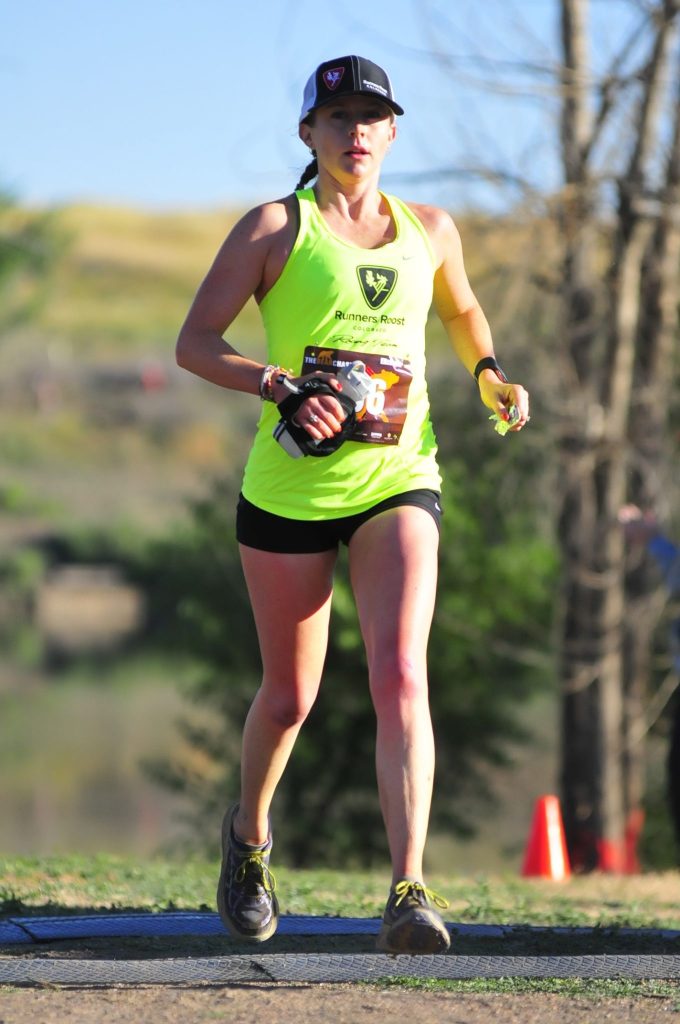
In running specifically, even if there were still an ounce of truth to the oft-cited 1978 study of a small group of men that suggested dropping X pounds would lead to X minutes shaved off a race, what about everything else we’ve learned since then? What about the failures of dieting and the harms of weight stigma and the health- and performance consequences of Relative Energy Deficiency in Sport? How does science (and our interpretations and culture) help heart-hurt or serve broken spirits?
My problem
For me, the problem presented as a trifecta of distorted body image, eating disorder (ED) symptoms, and compulsive behaviors including exercise. It started with body image and a corresponding cascade of negative commentary in my head, which persisted as long as I can remember. Discomfort—a squirmy, hopeless sensation—pervaded most experiences in my skin-sack of tissue. Somewhere, sometimes, I felt gratitude for my body, but ED is a loud close-talker, interrupting with vitriol and undercutting my existence.
For me, a distance runner since high school, the problem told me I wasn’t enough.
When I ran—cross country, indoor, outdoor, summer mileage, post-collegiately—it wasn’t fast enough to be the best, or even among the best. I wasn’t consistent or competitive enough in college to make nationals, let alone All-American dreams.
When I restricted—A, B, and C—it wasn’t enough to appear to be starving.
When I binged—1, 2, and 3, including just once a horrifying incidence of stealing my roommate’s succotash—it wasn’t enough to satiate me.
When I purged—in countless ways—it wasn’t enough to feel cleansed, ahead, or even even.
When I was praised for my appearance—“Wow, you’re disappearing before our eyes!”—I didn’t feel or see or believe it was enough.
In fact, I felt like I was a waste of space. That’s why I tried to quit running once.
I’d returned to New York City for cross country practice before my junior year of college. A myopic body distortion mortified me in my skin. I’d gained weight despite running every day at least once and strength workouts and counting calories and restricting and purging. I’d lost control and now everyone would know, I thought.
Fear gripped my throat when I saw the team, all lean and tanned and lanky and graceful, floating around gravel trails, across grass, up hills, down straight-aways like gazelles whose hides were stretched taut across angular skeletons. Our workout included 200-meter strides after a hilly run, and we accelerated around a burnt-orange track in groups of three and four, alternating leaders, and I wanted to die or at least shrink into the earth or evaporate into the hot summer air. Sticky humidity made me more uncomfortable. My skin chafed against my sports bra and my lungs wheezed, restricted by panic and embarrassment and shame.
A kind senior with dark curly ringlets said quietly, “Hey. Are you OK?” I started crying. I said nothing; I thought she wouldn’t understand, but she did. So did other teammates, underclassmen, who I sat next to during the coaches’ post-workout talk and later would see in the health center waiting room. EDs—and the culture that feeds them—are cruel, scheming year-round to sabotage our goals, dreams, potential.
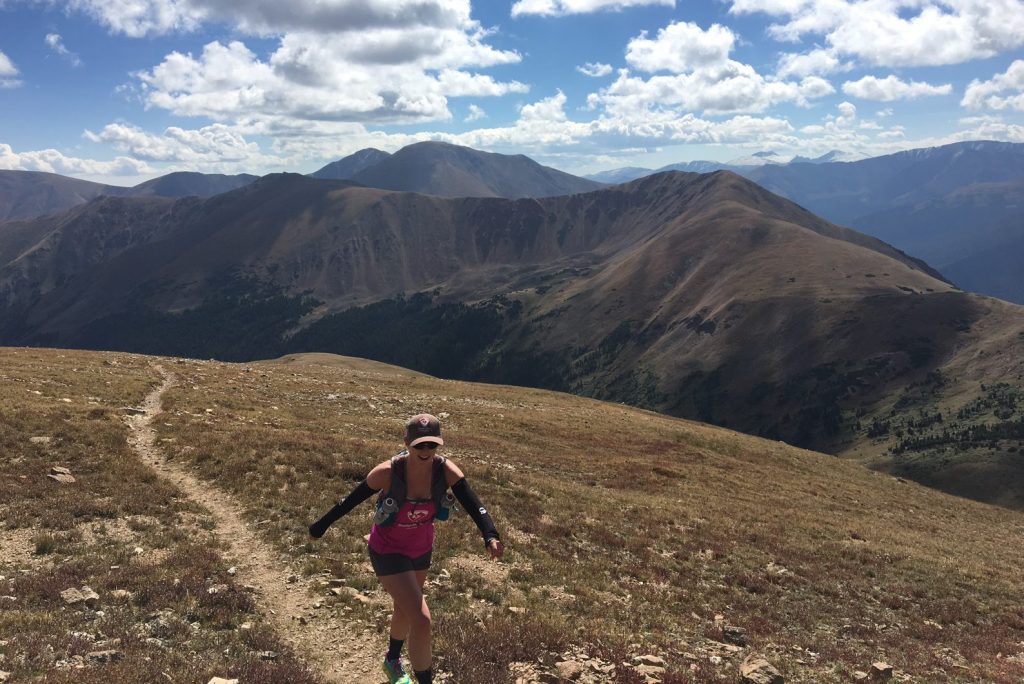
That week, I went to my coach’s office to quit, to excuse myself. “I don’t deserve to be on the team. I’m taking up space,” I said, admitting to restricting, bingeing, and purging. She stood up and walked around her desk to give me a hug. She said others struggled, too. “Stay on the team. I need your help with the underclassmen. Let’s take a break from racing and focus on training, getting strong, building a base.”
Somehow she thought I was enough. I stayed on, committed to logging mileage and leading B-team workouts. I sought treatment from the university’s eating disorder team, including visits with a registered dietitian, doctor, nurse, psychiatrist, and psychologist. They helped me tackle a confounding disease not succinctly specified by the medical diagnosis code, which has since been updated but has yet to capture the range of pathologic food and body issues. I was diagnosed with the female athlete triad, with bones leached of density, wracked hormones, and insufficient nutrition. I faced underlying depression head-on. I teetered on edge.
That year, a college teammate said, “But there are kids starving…how can you eat too much, or not enough, knowing that?” She asked as if I were unaware, without guilt, or unable to rationalize. Believe me, I said, I know. That’s why I’m ashamed and disgusted, I thought, yet still captive, paralyzed by genetic rhythms and old habits of a symptomatic, addictive disease.
Running’s problem
Eating disorders are a mental and physical illness that our sport has historically allowed to fester. Running, in fact, has fostered a full spectrum of disordered behaviors with its misguided emphasis on appearance and by clinging to age-old, unhelpful beliefs. Over time, I accepted what I knew intuitively, if buried deep down in my gut: losing weight, or trying to by restricting food and over-exercising, promises neither improved performance nor happiness. Whether a runner seems durable or delicate, neither losing weight nor looking a certain way guarantees anything, not even a decent race.
If losing weight seems, at first, to be a surefire shot at success, results fizzle. So does health. A host of issues, including season-ending injuries, nightly hot sweats, digestive troubles, and listless depression, crop up in low energy availability and ED’s wakes.
What’s more, we can’t tell whether someone has an eating disorder or is struggling with disordered behaviors by looking at them or even a scale. Any body, gender, or race may struggle, and misconceptions about that delay recovery.
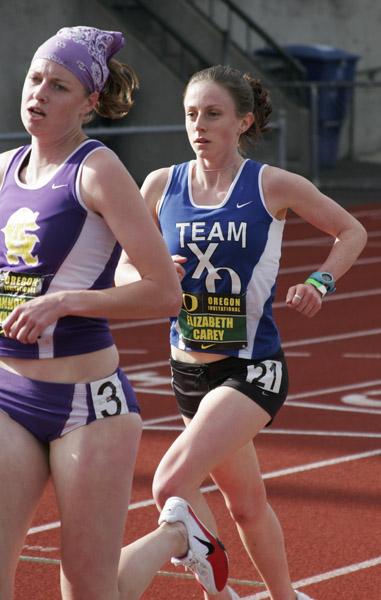
At one low point, when I sunk into a relapse after college, I weighed X, lean for my genetics and stature but not, I thought, apparently “sick enough” to be hospitalized or thrown into a treatment program. I weighed myself daily, as if a number could tell me how to be or feel or what, exactly, I should do with my life. (As if it didn’t reflect whether I’d pooped or was hydrated and BTW did you know weight often fluctuates throughout the menstrual cycle?)
During an interview at a university where I became an assistant coach, the head coach who’d recruited me in high school called my appearance out. “You’re leaner”—or did he say skinnier, lighter, fitter—“than you were before. Are you OK? Are you healthy?”
“Yes,” I said, scared and scarily flattered. “I eat healthy. I battled some demons in college, as many do. But when I came home, I stopped drinking so much and started sleeping more. I eat…practice yoga, and run regularly.”
Accurate? Yes. The whole truth? No. I didn’t know (or couldn’t admit) it then, but I still conflated my worth and my weight, and my worth and my food, and my worth and my training. To myself, and to whomever I hadn’t been or done enough. Them, too.
It seemed normal and common to track intake and restrict foods and workout deliberately, frequently and step on a scale daily. My college RD had given me food rules I tried to live by; I see now that was restrictive, unhelpful, and allowed harmful coping mechanisms to flourish.
My running problem
I eventually ran marathons. In Eugene, I dug deep to finish with shut-down quads and a stress-fractured foot. In the lead-up to and through the race, my body was in limbo: fueled by a heartier diet, trained by an inspiring mentor-coach, yet still reeling. The pain in my foot marked my fifth or sixth stress fracture, a symptom of osteopenia, the precursor to osteoporosis.
The finish was far off what was then the US Olympic Trials B qualifier—my goal—by more than five minutes. My family cheered me on that day, bundled up and giddy along the course, and for that I was grateful. But the day didn’t fill me up. It made me wonder and pine for more.
I knew I was going to suffer—not just physically, but emotionally and spiritually—when I purged. I knew a fog, a dense cloud of guilt and bottomless disappointment, would move in, obscuring my vision and heart and any sort of internal compass.
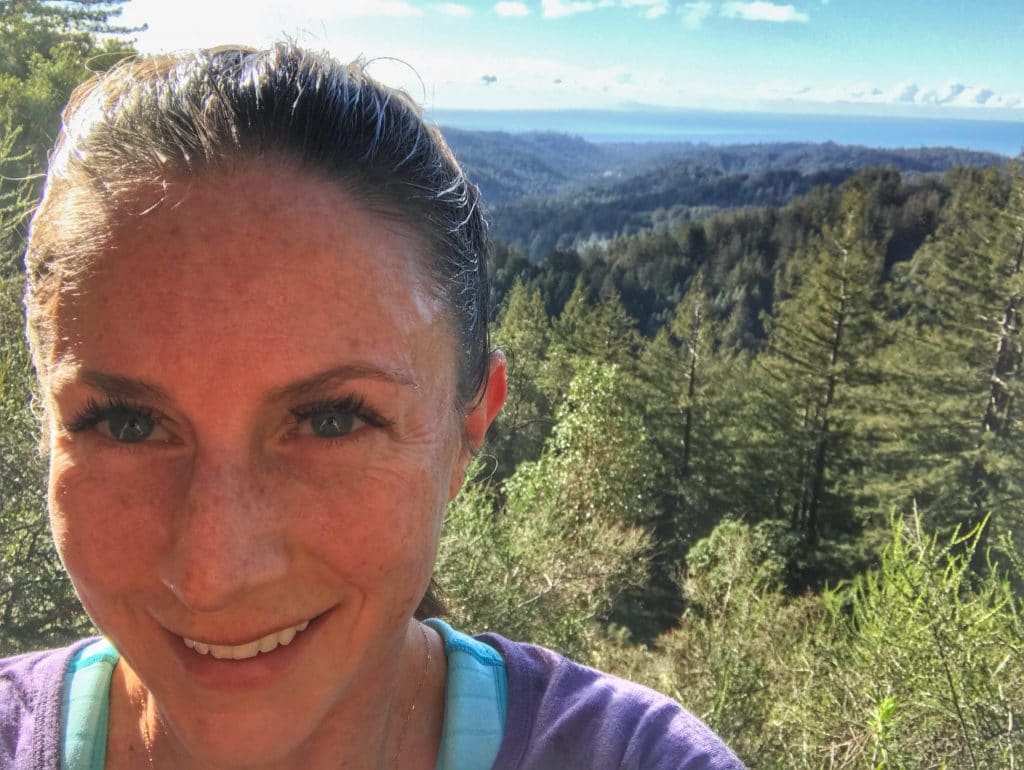
I went ahead anyway because I thought I deserved it (and that’s what the disease had me believe). I thought I needed to reset, to balance out something I’d done, to repent for a binge, excess, or misstep. I felt I was falling behind, even though my competitors were no longer tangible, just imaginary.
It was that faceless ED bitch one-stepping me. I thought I could catch her. The purges perpetrated the cycle of awfulness that was spinning still so far out of control that I didn’t know where to look or how to get out.
Exacerbated by grief and anxiety, my struggles persisted for another decade. I dabbled in therapy and guidance from RDs, and avoided mirrors and scales and immediately got rid of unzippable jeans and allowed myself mostly whatever I wanted to eat and pretended that I was OK, because I was functioning in a society that welcomes stereotypes, diets, body shaming—especially my privileged corner of the universe, where the superficial bubbles up, distracting us from the real, wide world and its oppressive structures.
On recovering
Like growing up and running faster, recovery doesn’t happen overnight. It’s like, as Melody Fairchild says, the “becoming” of The Velveteen Rabbit. It happens one step at a time. I am fortunate to have access to healthcare and a support crew that has helped me incrementally tackle physical, mental, emotional, and social justice facets of EDs.
We keep choosing, over and over, what might satisfy us. Each day, each breath is a choice, whether conscious, and it is natural at best and a fight at worst. We must tap at our hearts, let our minds become willing, pick up the pen and write, find the trailhead and go.
Here, now, is enough.
That pre-start-gun-shot moment on the line when all you’ve got is where you are.
A second in a yoga studio when your eyes find one point of focus in the mirror, perhaps themselves, and you breathe slowly, however contorted your arms and legs.
A few minutes near a bald eagle that sits massive and regal on a limb in a city park tree and cares little about you, swiveling its head side to side, scanning for something out of sight.
An hour to put ink to page to see what flows out, rises and falls, evaporating in an instant, only to emerge in descending big, fat, splatting droplets that will rise again a soft dew.
A 40-minute silent run just below the waterfalls that tumble through an expansive lava field, along the Deschutes, a river into which we put my Daddo’s ashes; they have floated the water, come to shore, blended with the cinder we tread along banks where hawks swoop and fish.
One minute on a trail when you hear a breeze whoosh through pine treetops and hummingbirds’ chirping whirs flitting around a stream-cut green valley in foothills of the Rockies as you labor uphill.
A westward evening commute with views of wind blowing snow off stark ridges backlit by a setting sun that glows orange against a clear blue sky, Denver’s hallmark. That is enough to open up and fill my heart with a vast azure, closeness and wholeness, the views and expanse, the sanctity of earth that nourishes and grounds me here.
Here, now, I am enough and feel that in my bones and heart and my soul echoes that it is full, strong, vibrant.
If you or someone you know is struggling with food and body issues, call the National Eating Disorders Association’s helpline at 800-931-2237, text NEDA to 741-741, or visit https://www.nationaleatingdisorders.org/ for more information.
Additional mental health resources:
National Suicide Prevention Lifeline
1-800-273-8255
Substance Abuse and Mental Health Services Administration Disaster Distress Hotline
1-800-985-5990
Text TalkWithUs
National Domestic Violence Hotline
1-800-799-7233
National Sexual Assault Hotline
1-800-656-4673
Online.rainn.org



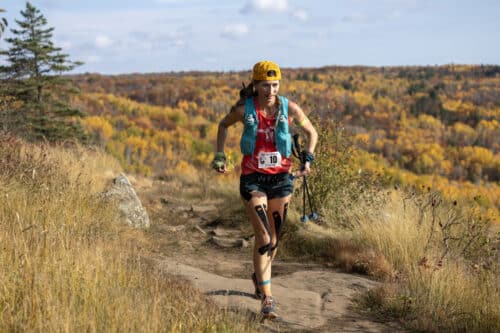
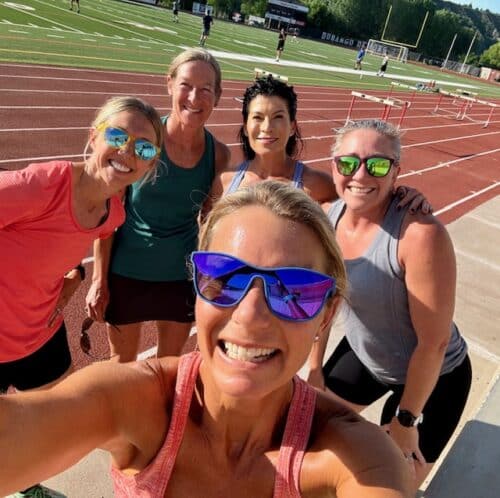





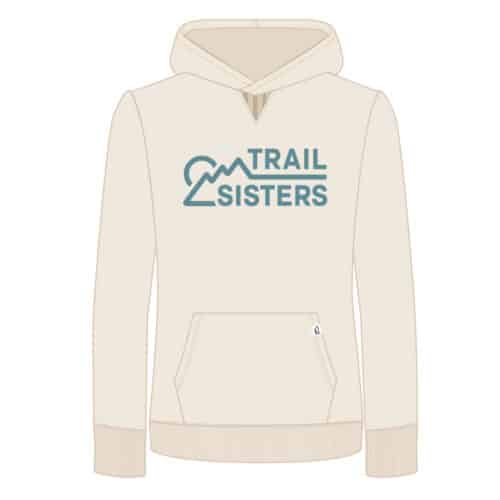
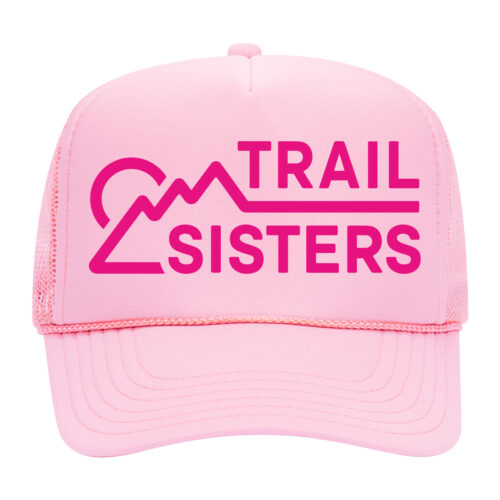
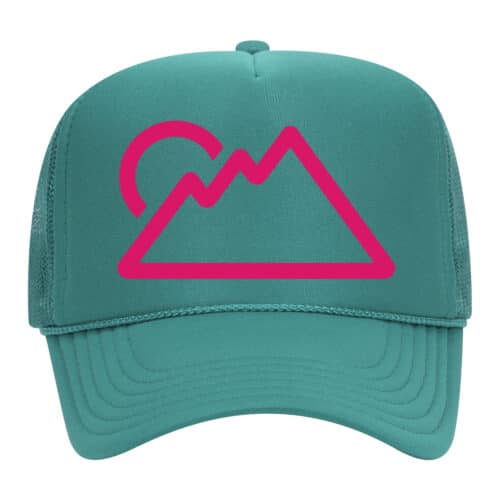


15 Responses
What a beautiful, honest, heartbreaking and raw piece. Thank you Elizabeth for your willingess to bare your soul for all to learn from and reflect on. Bravo for the courage and vulnerability it took the write and post this. I have so much admiration for you.
Thank you so much Holly!
What a powerful piece Elizabeth .. your dad would be busting with pride about your writing skills .. love and hugs
my thoughts exactly. Love you Eliz
Thank you both! Xo
This is some excellent writing Elizabeth Carey. Much love and support to you and a huge hug. Demons, they come in all forms and you have identified yours. And while some may have been privey to your struggles this is my first inkling that all may not have been what I thought. I just thought you liked to run. Oh my goodness, another hug. Take care!
Thank you! I do like to run (haha) and I’m so grateful a love for the sport (and the people I met through running) helped me find health and happiness.
I had no idea. It’s not something associated with high-level athletes and this shows that pressure can be felt by anyone. Thank you for sharing and I wish you all the best.
Thanks Graham!
Thank you for sharing Elizabeth. A journey far too many of us have been on.
Thank you so much for your bravery, speaking about this, and continuing the conversation!
Beautiful honest writing and a big big hug to you! I’m so glad stories like yours are being shared more — perhaps the more they are shared, the less stigmatizing and isolating eating disorders/food/body image struggles will be.
Thank you so much for sharing this. You are not alone in your struggle and tonight, at a time when I really need it, I know that I am not alone either. Much love to you, sister.
Elizabeth, thank you so much for your eloquent and honest words, and for allowing yourself to be vulnerable so that many of us can rest assured that we are not alone. Wishing you all the best!
Thank you. Thank you for your transparency and encouragement by just sharing. I am (gulp) 32 days away from 40. In my late 20’s and early 30’s were my peak performances and I worked so very hard to get as light as I could, perform as best as I could. And even now, after becoming Mommy, and working so hard to be OK with myself, it still hovers around me. The voice is triggered by something so small and once it starts, it’s hard to make stop. Glenwood and the RFV have been a healing place for me but it still hovers. Keep speaking out. Maybe the little girls in the next gen and maybe even us grown ups will start to see ourselves as enough.